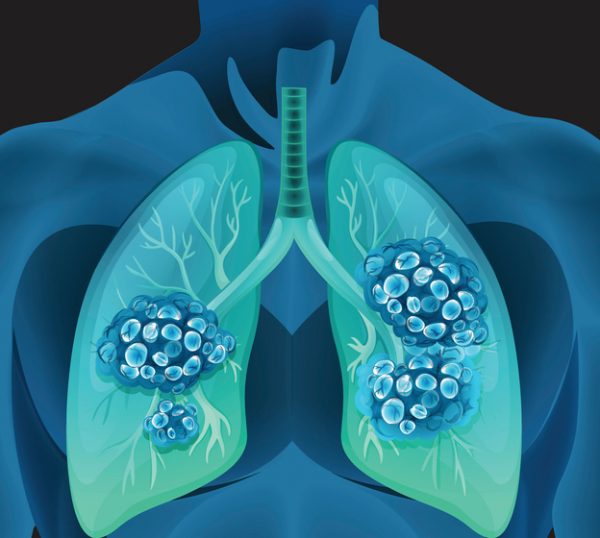
When lung cancer advances after initial lines of therapy, the treatment options dwindle. An AbbVie drug gives patients a new choice as the first FDA-approved treatment for advanced cases of non-small cell lung cancer (NSCLC) driven by a particular cancer protein.
Approval of the drug, telisotuzumab vedotin, brand name Emrelis, covers the treatment of non-squamous NSCLC that is locally advanced or metastatic, the FDA said Wednesday. Eligible patients must have received at least one prior systemic therapy and their disease must also have high expression of a protein called c-Met.
While c-Met plays a role in normal cellular processes, dysregulation of this protein can contribute to cancer growth. According to AbbVie, c-Met is overexpressed in about 25% of advanced non-squamous NSCLC cases where the EGFR gene does not have any mutations. Of these patients, about half have high c-Met overexpression. These are the patients that may be treated by Emrelis under the product’s label. Alongside the drug’s approval, the FDA approved a Roche companion diagnostic to identify patients eligible for the drug.
Emrelis belongs to the class cancer therapies called antibody drug conjugates (ADCs). The antibody component of Emrelis targets c-Met, delivering to cells expressing that protein a drug payload of vedotin, a chemotherapy. This AbbVie drug is administered as an intravenous infusion every two weeks.
The regulatory submission for Emrelis was based on an open-label Phase 2 study that included 84 patients who had received a prior systemic therapy for their lung cancer. Results showed a 35% overall response rate. The median duration of response was 7.2 months. The most common adverse reactions reported in the study were peripheral neuropathy, fatigue, decreased appetite, and peripheral edema. Data from this study were presented last year during the annual meeting of the American Society of Clinical Oncology.
“We have observed a paradigm shift in oncology in recent decades toward personalized, biomarker-driven therapeutics, allowing for better selection and optimized treatment outcomes,” Dr. Jonathan Goldman, professor of medicine, director of thoracic oncology clinical trials, UCLA, said in a statement included in AbbVie’s announcement of the approval. “People with c-Met overexpressing NSCLC have poor prognosis and limited treatment options, and Emrelis is a first-in-class ADC that can address a critical unmet need for this patient population.”
[Update: The following three paragraphs added with analyst comments.] Neha Anand, analyst at biopharma intelligence services firm Citeline, views the Emrelis approval as a major step forward in precision oncology. Citeline estimates the new AbbVie drug could reach a patient pool of more than 60,000 patients in the U.S. and the five largest European economies alone, representing a significant commercial opportunity, she said in an email. But Anand added that safety could be a concern, pointing to reports of adverse events in the study, named LUMINOSITY. Study results show 51% of patients treated with the AbbVie drug developed peripheral neuropathy; 11% of those cases were classified as Grade 3. This complication led 13% of trial participants to permanently discontinue treatment.

The Human Algorithm: What AI Can’t Replace in Pharma Engagement
At a time when AI is reshaping pharma, Reverba Global CEO Cheryl Lubbert explained in an interview why empathy, context, and ethics still require a human touch.
“Peripheral neuropathy, a major adverse event of the LUMINOSITY trial, is cumulative and hard to reverse, which may limit prolonged use,” Anand said. “Emrelis is currently approved post-platinum [chemo]therapy, which already leaves patients weakened, and physicians would prefer agents with better tolerability if available.”
Meanwhile, competition is looming. Novartis’s Tabrecta and EMD Serono’s Tepmetko are both approved for treating NSCLC in patients whose tumors have MET exon 14 skipping mutations. Clinical testing of both oral small molecules is underway in a patient pool similar to that of the AbbVie drug. The safety profiles of the Novartis and EMD Serono drugs are generally more favorable and better understood, given their longer time on the market, Anand said. If these drugs can expand their approvals, their tolerability alone could give them an edge over Emrelis, especially if survival outcomes are comparable, she explained. That makes the Phase 3 test for Emrelis crucial.
The regulatory decision for Emrelis is an accelerated approval based on the Phase 2 results. To retain approval, the drug must verify clinical benefit in a larger confirmatory clinical trial. This Phase 3 study is already underway with a targeted enrollment of 698 patients. Treatment with Emrelis is being compared to docetaxel, a standard chemotherapy for advanced cases of NSCLC.
The two top-selling products in AbbVie’s oncology portfolio are Imbruvica and Venclexta, both blockbuster oral small molecule drugs marketed with partners for the treatment of several types of blood cancers. AbbVie’s oncology strategy includes expanding its portfolio with drugs that address solid tumors. Emrelis came from AbbVie’s internal ADC research. The company said this product represents its first internally developed solid tumor medicine as well as its first solid tumor FDA approval in lung cancer. AbbVie is also pursuing c-Met with another ADC, telisotuzumab adizutecan. The clinical program for this drug spans NSCLC, colorectal cancer, and gastroesophageal adenocarcinoma.
AbbVie’s cancer drug lineup already has a commercialized ADC. Elahere, the first ADC approved for ovarian cancer, joined AbbVie’s portfolio via the 2023 acquisition of that drug’s developer, ImmunoGen. That deal included IMGN151, a next-generation ADC for ovarian cancer that is currently in Phase 1 testing. Other ADCs in the AbbVie pipeline include ABBV-706 for small cell lung cancer, central nervous system tumors, and neuroendocrine carcinomas, and ABBV-969 for prostate cancer. Both are in early clinical development.
Image: blueringmedia, via Getty Images








